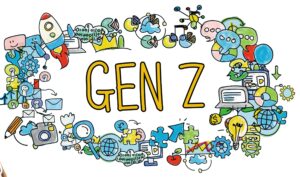
Generation Z, also known as Gen Z, iGeneration, or Zoomers, refers to individuals born between 1996 and 2012 (13 – 30 years old). This cohort is characterized by its unique upbringing in a digitally connected world, diverse backgrounds, and distinct values and attitudes towards work and life. Gen Z is poised to bring significant changes to the workplace as they enter the workforce.
Gen Z grew up during rapid technological advancement and significant global events. They are the first generation to have been raised with smartphones and social media from a young age, making them true digital natives. This exposure has shaped their communication styles, learning preferences, and social interactions. Additionally, Gen Z has been shaped by significant events, including the Great Recession, the COVID-19 pandemic, and various social justice movements.
Gen Z is known for its pragmatism, resilience, and strong sense of social responsibility. It values diversity and inclusion and is more likely to support brands and employers that align with its ethical standards. This generation is also highly collaborative and values transparency and authenticity in its interactions.
As Gen Z enters the workforce, they are expected to bring several key changes:
Digital Fluency: Gen Z’s comfort with technology will drive further digital transformation in the workplace. They are skilled at utilizing digital tools and platforms, which can significantly enhance productivity and innovation.
Demand for Flexibility: This generation values work-life balance and flexibility. They will likely seek employers offering remote work options, flexible hours, and a focus on mental health and well-being.
Focus on Purpose: Gen Z employees seek work that has meaning and makes an impact. They are drawn to organizations prioritizing sustainability, social responsibility, and ethical practices.
Diversity and Inclusion: Gen Z is the most ethnically and racially diverse generation in history. They expect workplaces to reflect this diversity and to foster inclusive environments where all employees feel valued and respected.
Entrepreneurial Spirit: Many Gen Z individuals aspire to be entrepreneurs or to innovate within their roles. They are less likely to stay with a single employer long-term if their needs for growth and alignment with company values are unmet.
Conclusion
Generation Z is set to redefine the workplace with digital fluency, a demand for flexibility, a focus on purpose, and a commitment to diversity and inclusion. Employers who understand and adapt to these values will be better positioned to attract and retain top talent from this dynamic generation.
Forbes Human Resources Council
